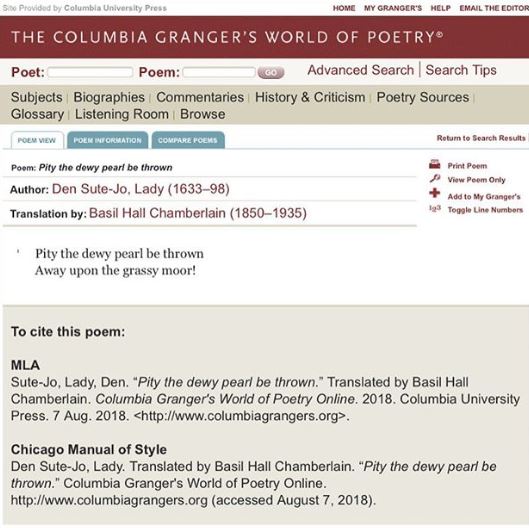Siobhan Phillips — A Case for Collected Poems
The following post is by Siobhan Phillips, author of The Poetics of the Everyday: Creative Repetition in Modern American Verse:
We come on poetry in any number of ways. We dip into anthologies, page through journals, take in our favorite’s latest book; catch poems in a link, sidebar, scrapbook clipping, subway poster, or app spin; hear them in the ghost of someone’s half-memorized quotation, in music and commercials and movies, in or our own not-quite-accurate regurgitations. The range of prompts and magnets for poetic experience in our lives is one good reason that poetry remains a year-round activity.*
This April, I’d like to make the case for a particular type of poetry-experiencing: the Collected Poems. Fat volumes in sober fonts gathering all of one writer’s work. Uniform format, chronological logic. Practically, they can be unwieldy and theoretically, they can seem naive. Why take on these bricks if the author serves merely as a convenient category of organization and chronology implies a false ideal of progress? Once I begin to read, though, objections dissolve. I’m seduced by the sense of comprehensiveness, a deepening into the fullness of a single sensibility. Collecteds show how poetry is a style of thought—a way of living and doing as well as a product of living or something done. They dramatize poetry’s oscillation between the single poem, a defined work, and the general medium, an indefinite capacity.
I’ve been thinking about this, maybe, because there have been a more-than-usual number of worthy Collecteds published since Poetry Month 2012. We now have the no-longer-neglectable achievement of Joseph Ceravolo, for example—part collage, part missal. The full record of Lucille Clifton’s oracular, conversational testimony. The eclectic geography of Ed Dorn, moving from gunslingers of the nineteenth-century west to crusaders in thirteenth-century Europe. Jack Gilbert’s mobius strip of spare and self-indulgent. The meta-mythical case studies of Louise Gluck. In a review of Marianne Moore, David Bromwich speaks of an “atmosphere-of-Mooreishness,” and that’s what I relish in Collected reading: the atmosphere of whoever-ishness. Such flavor—an outsider’s intimacy—comes before judgment and (I think) has a value apart from it. One won’t like all of any book on this list; at least, I don’t.
But reading through them clarifies what I do—and how I do, as well.
I want to resist, then, an idea of the Collected as comprehensive and impossible—books that are meant to sit on the shelf for occasional reference. Think of them as immersive and malleable—books that one can enter and navigate according to one’s own predilections. Mixing the sounding of dark fathoms with the cruise control through flat patches, skipping back and ahead. Pausing, checking how far I’ve come. Reading a Collected, single poems I already know swim up into different and clearer position (”Mock Orange,” “Searching for Pittsburgh”) even as single poems I didn’t already know take on the status of landmarks (“Lighthouse”). Tuned to a poet’s key, I can better appreciate both its sometime modulations and its consistent overtones. How much of Clifton is about her mother, how much of Gluck is witty; how romantically prophetic is early Dorn (and how that prophecy curls into satiric disgust by the last writing). In The Poetics of the Everyday, I argued for verse-making as analogue and practice for daily existence, with its steady pattern of consistency and steady potential for change. Making my way through Collecteds reminds me that the reading poetry as much as writing it can mark and constitute what I might risk calling the life of the mind. Or even just life?
*See Mike Chasar’s Everyday Reading: Poetry and Popular Culture in Modern America for details.
1 Response
Leave a Reply
You must be logged in to post a comment.



Collected works are my favorites. I agree how a collection of one poet’s work provides a comprehensive overview of the transformation of their theme and style through the process of their living and dreaming.
Two years ago when I published all the poems I wrote the past 25 years in a 3-volume set, I was first able to get a comprehensive overview of my progress in developing the craft of capturing musically the intensity of perception.
Seeing them collected also inspired me to attempt to write an epic about scientists. I have written 60,000 lines of blank verse so far. I am focused more completely on creating a comprehensive world view through the musicality of poetry and story telling.